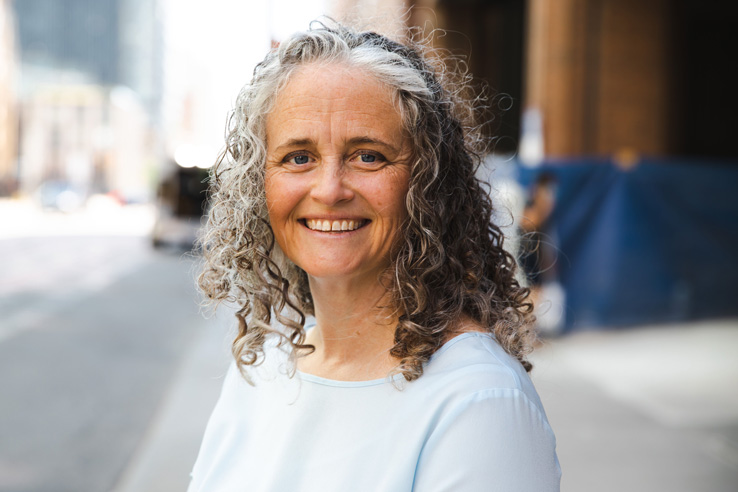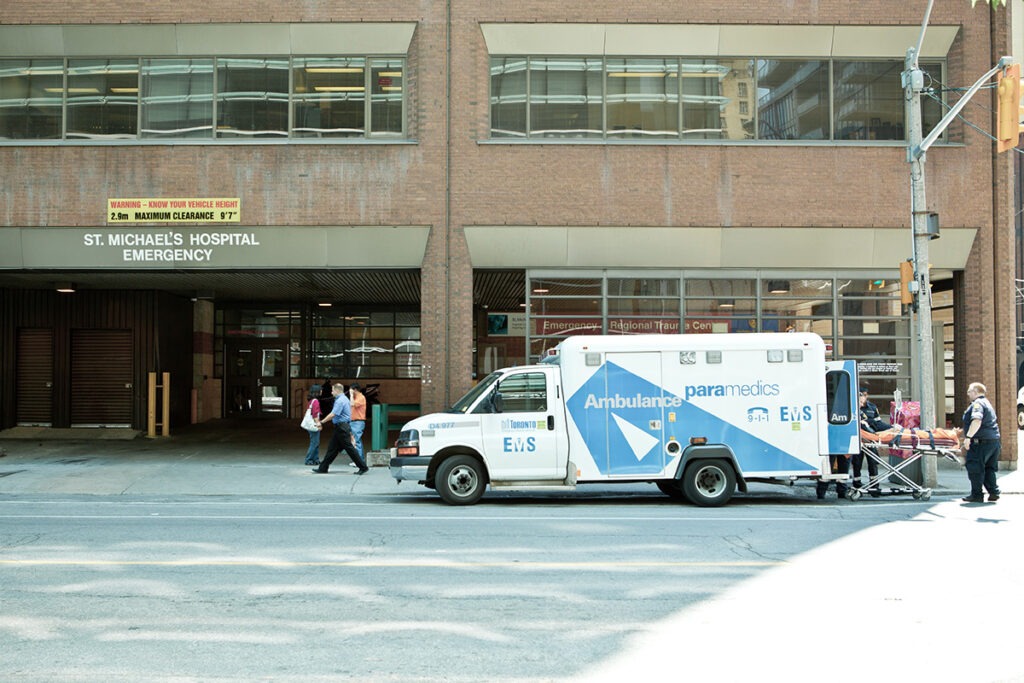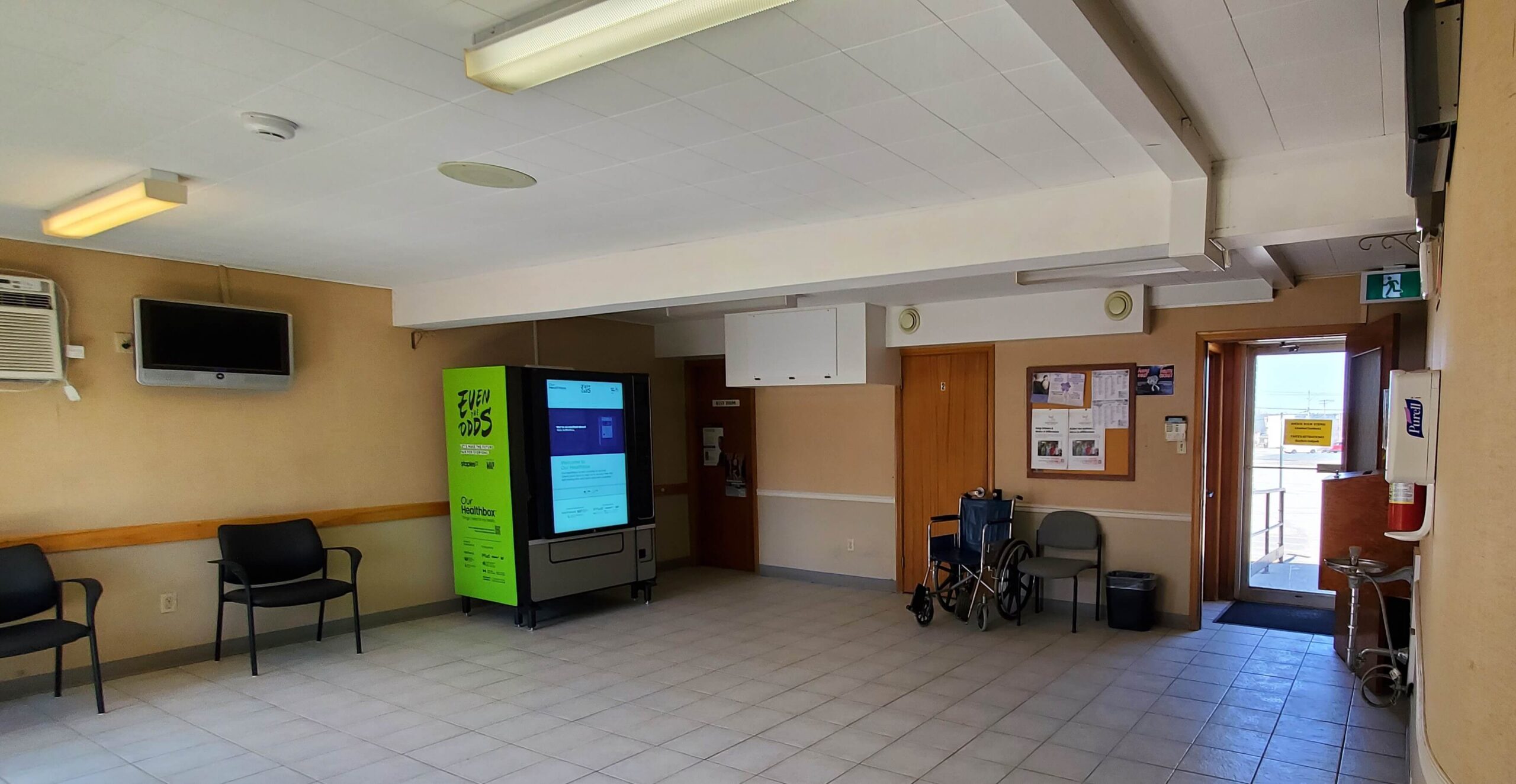Dr. Carolyn Snider was a guest on the Emergency Medicine Cases podcast to speak about what it means to be a leader in the field of emergency medicine. Dr. Snider is the former Chief of Emergency Medicine, Unity Health Toronto.
Author: Samira Prasad
Changes to cervical cancer screening in Ontario
CityNews spoke with Dr. Mandana Vahabi about the new HPV screening guidance making detection easier and faster, to prevent cancer from developing and improve quality of life for women.
Opinion: Ontario needs culturally sensitive, self-collection HPV screening for all women
In this op-ed, Dr. Mandana Vahabi outlines how Ontario provincial government’s current HPV screening strategy has left many structurally marginalized women on the sidelines. She also shares the many benefits to switching to HPV self-tests to ensure access to cervical cancer screening for all.
This op-ed was also featured in the National Post and The Ottawa Citizen.
Many people don’t get screened for cervical cancer. Self-testing kits can change that
While cervical cancer screening is a routine part of health care for Canadians, many fall through the cracks. Dr. Mandana Vahabi‘s latest research found that offering self-screening kits to sex workers and former prisoners – who are some of the most under-screened populations in Ontario – broadened the reach of cervical cancer screening across the province. She spoke to the Toronto Star about these results.
Mandana Vahabi joins Bloomberg Nursing and Unity Health Toronto as Women’s Health Research Chair
From U of T
Mandana Vahabi, a champion of equitable access to reproductive health care for women, has been appointed Professor at the University of Toronto’s Lawrence Bloomberg Faculty of Nursing, and Women’s Health Research Chair at Unity Health Toronto health care network, a jointly held position at the two institutions. She began her new role on September 1, 2024.
“I am honoured to be joining Bloomberg Nursing and Unity Health Toronto as a full professor and as the Women’s Health Research Chair. This position not only aligns with my commitment to advancing health equity but also demonstrates the focus of both institutions on supporting the care needs of diverse communities. I am excited to work together with students and faculty to continue to have an impact on women’s health,” says Vahabi who is also an alumna of Bloomberg Nursing having completed her PhD in 2003.
The Women’s Health Research Chair is made possible through the generosity of the Government of Ontario and St. Michael’s Hospital, a site of Unity Health Toronto. With this support, the Women’s Health Research Chair facilitates the integration of research, education, and clinical practice in advancing access and equity in women’s health. Vahabi’s research will be based at St. Michael’s Hospital’s MAP Centre for Urban Health Solutions.
At Bloomberg Nursing, Vahabi joins a prestigious group of donor-funded, endowed research chair holders that highlight the significant role the Faculty plays in improving patient and population health on a global stage.
“We are very pleased to welcome Professor Mandana Vahabi back to Bloomberg Nursing where she first launched her research career as a PhD graduate, and look forward to our shared partnership with Unity Health Toronto as we continue to drive innovation in women’s health forward,” says Robyn Stremler, Dean of the Lawrence Bloomberg Faculty of Nursing.
As a researcher, Vahabi is a leader in addressing critical health disparities among structurally marginalized groups including refugees, immigrants, and sex workers.
She has most recently piloted a research study examining the impact of HPV self-sampling tests as an alternative to pap tests, to improve access to cervical cancer screening for women. As Ontario looks to adopt HPV cancer screening in replacement of traditional pap tests, Vahabi is currently advocating for the inclusion of HPV self-sampling tests as part of this new cancer screening guideline.
“Allowing women and those with a cervix to self-sample for HPV removes barriers to care access and gives women a sense of bodily autonomy. Here in Canada and around the world, the reproductive health of women is scrutinized without including women in decision-making about their own bodies. Using this self-administered test recognizes the values and care needs of many different cultural and ethno-racial groups and gives them freedom of choice over their own body and how they choose to receive care,” says Vahabi.
Cervical cancer is primarily caused by the Human Papilloma Virus (HPV) and a transition to HPV screening would allow for more accurate detection of the disease and a person’s subsequent cancer risk. The new testing method would also increase the length of time between screening tests, from three to five years.
Many women avoid pap tests Vahabi says, for a variety of reasons including lack of knowledge and factors related to sexual violence and trauma, in addition to distrust of health care providers. A self-sample test, done in the privacy of the individual’s own home would greatly empower them.
For Vahabi, research alone is not enough, but translating that knowledge into actionable policies is crucial for lasting change. Nurses she believes, are uniquely positioned to shape public health strategies and address these structural challenges facing women’s health. It is her hope, she adds, that the future of nursing will involve the implementation of innovative care models that prioritize health equity including improving health for women and underserved populations.
“Unity Health Toronto is committed to promoting and finding solutions for health equity and improving health outcomes for those facing barriers accessing care. We are thrilled to have Mandana join our MAP Centre for Urban Health Solutions at St. Michael’s and further advance our world leading research centre dedicated to creating a healthier future for all,” says Sonya Canzian, Executive Vice President Clinical Programs, People, and Chief Nursing & Health Professions Officer. “We are also looking forward to Mandana’s contributions to building our nursing research capacity through mentorship and leadership.”
One of Vahabi’s key priorities is to mentor and support emerging scholars to foster a diverse and inclusive research environment and encourage a broad range of perspectives. For her undergraduate students at Bloomberg Nursing, she is eager to help them broaden their knowledge about their own ability to impact the health of those around them.
“I really want my students to understand the critical importance of addressing health disparities and to recognize the wider role they can play in advancing justice and equity, in their own careers as nurses, and in their communities, says Vahabi, “if I can advance this understanding, then I have done my job.”
Op-ed: Is peer-review dead? A scientist’s plea to fix a broken system
In this op-ed for Healthy Debate, Dr. Mohammad Karamouzian discusses the ways in which the research community could improve the peer-review system in a way that works for researchers, reviewers and editors.
Primary care in Canada is suffering and doctors want input on how to fix it
In this op-ed for the Toronto Star, MAP scientist and OurCare lead Dr. Tara Kiran reflects on the learnings from the OurCare Standard and underscores the importance of the ongoing survey to hear how people across Canada’s care measures up.
How St. Michael’s Hospital is trying to break the cycle of readmissions for homeless patients
MAP’s Navigator program pairs hospital patients who are homeless with an outreach counsellor—a “Navigator.” The Navigator gets to know the patient and connects them with the health and social support they need to break cycles of homelessness and poor health, and to move forward in securing housing that works for them.
“It’s like having a super advocate,” shared Dr. Stephen Hwang, project lead.
The program started at St. Michael’s Hospital in Toronto, and thanks to the Even the Odds partnership with Staples Canada, has expanded to St. Paul’s Hospital in Vancouver, increasing the program’s reach to over 1000 patients served to date. The program will be launching at the University of Montreal Hospital Centre later this year.
This article from The Canadian Press sheds light on the day-to-day work of the Navigators, and how far a personal connection with patients can go in helping them get the care they need.
The Our Miramichi Community Healthbox: A new chapter in compassionate care
Nestled along the banks of the Miramichi River, our city may not rival Moncton, Saint John, or Fredericton in size, but it certainly matches them in spirit, determination, and community pride.
Like many urban areas, Miramichi faces complex challenges—ranging from healthcare access to social inequities—but unlike larger cities, we often do so without the same level of funding or infrastructure.
Today, we are celebrating a new collaborative, innovative effort of community-led change: the arrival of a Healthbox in Miramichi.
Developed by Dr. Sean B. Rourke, Director of REACH Nexus at the MAP Centre for Urban Health Solutions at St. Michael’s Hospital (Unity Health Toronto), the Healthbox is more than just a machine—it’s a symbol of accessible, inclusive healthcare.
These smart, touchscreen-enabled vending machines are stocked with essential, no-cost wellness supplies and designed to meet people where they are — physically and socially.
“This initiative is a step toward increasing equitable access to wellness items and essential harm reduction supplies for our most vulnerable community members,” said Dr. Arifur Rahman, acting deputy Chief Medical Officer of Health of New Brunswick. “By reducing barriers and meeting people where they are, we are addressing the social determinants of health and advancing our commitment to health equity and community well-being.”
The Miramichi Healthbox, located at 10 Hotel Dieu Street, is a result of an incredible partnership between AIDS New Brunswick and Horizon Health Network (Horizon), offering access to health and harm reduction supplies. Staples Canada through the Even the Odds program – an innovative partnership between Staples Canada and MAP at St. Michael’s Hospital – is generously supporting the Miramichi Healthbox.
“We would love to have more of these Healthboxes in our communities and are excited for the launch of the Miramichi Healthbox,” said Linda Thompson-Brown, Executive Director of AIDS New Brunswick. “This is a free, low-barrier method of getting access to harm reduction and healthcare supplies can be life-changing—and in many cases, life-saving—for people who are underserved and who face barriers due to stigma and discrimination.”
It includes HIV self-testing kits, naloxone kits to reverse opioid overdoses, and a range of wellness products, such as menstrual hygiene items and seasonal necessities like hats and gloves. All items are chosen to the unique needs of our community.
This initiative is rooted in equity, compassion, and innovation. And it’s already making waves—not just in Miramichi, but across Atlantic Canada, with six Healthboxes currently in operation and more planned for Newfoundland, Nova Scotia, and Prince Edward Island. Staples Canada through its Even the Odds program supports the Healthboxes in Atlantic.
“The Healthbox is a vital resource that supports both individual and community well-being. Its services play a crucial role in providing low-barrier access to harm reduction initiatives, especially for individuals most vulnerable to stigma, isolation, poverty, and other socioeconomic challenges,” said Deatra Blacquier, a Public Health Nurse with Horizon.
The project is generously supported by Even the Odds, a unique partnership between Staples Canada and the MAP Centre for Urban Health Solutions. This funding helps ensure the continued growth of Healthbox technology, allowing more communities to benefit from its presence.
What makes the Healthbox particularly innovative is its integration of real-time data analytics. These insights help monitor usage, track supply levels, and identify emerging community health trends—enabling faster, smarter responses to evolving public health challenges.
So far, Healthboxes have been visited over 122,000 times, distributing more than 54,000 essential items—including over 2,200 naloxone kits. These numbers reflect more than just product distribution—they tell the story of lives supported, stigma reduced, and barriers broken.
For Miramichi, the arrival of the Healthbox represents more than a new service—it’s a powerful example of what can be achieved when local organizations, healthcare professionals, and compassionate citizens come together for a common goal.
We may be a smaller city, but we’re proving that size doesn’t define impact. With resourcefulness, resilience, and a commitment to community care, Miramichi continues to pave the way for healthier, more inclusive futures—one thoughtful initiative at a time.
Honouring our incredible staff: Congratulations to the 2025 MAP Awards winners!
On June 5, MAP Centre for Urban Health Solutions announced the winners of the 2025 MAP Awards: Moizza Zia Ul Haq, Katherine Griffin, Hayley Thompson and Cassandra Bertucci. These annual awards recognize outstanding MAP staff, students or volunteers who have excelled in their roles and demonstrate a passion and commitment to applying MAP’s values in their work.
Moizza Zia Ul Haq (she/her), Research Coordinator on Dr. Nav Persaud’s team, is a winner of the MAP Values in Practice Award, an award to recognize an individual who exemplifies and advocates for MAP values in their work and interactions. From Moizza’s nomination: “Moizza’s compassion and excellent communication skills have been noted by many patients… participants routinely ask to speak to her by name.”
Katherine Griffin (she/her), Research Program Manager on Dr. Darrell Tan’s team, is also a winner of the MAP Values in Practice Award. From Katherine’s nomination: “Katie advocates ceaselessly for ensuring equity in the lab… she is an exemplary leader who promotes MAP principles every day that she is on the job.”
Hayley Thompson (she/her), Research Program Manager for Ontario’s Drug Checking Community, is the winner of the MAP Community Partnerships Award, an award to recognize an individual who consistently models exemplary community partnership practices and integration of the perspectives of community and people with lived expertise into their research. From Hayley’s nomination: “Hayley’s approach goes beyond mere consultation—it is about creating genuine spaces for people to be heard, valued, and supported.”
Cassandra Bertucci (she/her), Research Coordinator on Dr. Darrell Tan’s team, is the winner of the MAP Peer Mentor Award, an award to recognize an individual who works hard to help colleagues learn, feel valued and do well at work. From Cassandra’s nomination: “Cassandra fosters an environment where people are encouraged to ask questions, learn from their experiences and thrive in their roles.”
Congratulations to all of our 2025 MAP Awards winners and nominees!








